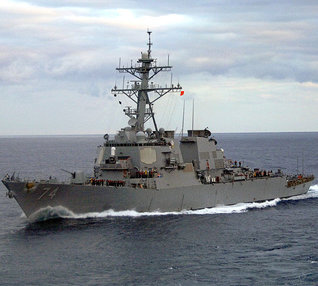
GoNavy
New York, NY
Male, 28
I went to Yale NROTC and received a commission as a Navy SWO (ship officer). I didn't renew my service after the required years. I wanted to move on to make a civilian life for myself but not a day goes by that I don't miss the Navy.
My first sea assignment was a DDG (destroyer) on which I was a division officer overseeing more than 20 sailors. Then for shore duty I was an instructor at SWOS. For my final year I returned to a new ship as a division officer.
Hey there! During my service I never saw crazy hazing customs. There were some traditions that were done when someone achieved some kind of qualification, but serious hazing would not be allowed. (Except of course for any offiicial Navy required tests)
As a Navy officer onboard a ship, danger came in the form of accidents, not attack.
There have been a few times when my adrenaline has gone up considerably, though.
Here's a list I came up with:
-Helped put out a fire in the engine room.
-Our ship was on a collision course with a ship that did not respond to radio messages. The Commanding Officer likely saved our lives by ordering the ship to turn off course as quickly as possible (called evasive action) instead of demanding the ship to follow our orders.
-Recreational motorboat came suspiciously close to our ship near Spain. They came closer than the required distance. We did not engage the boat, but it was pretty scary. (see "USS Cole attacks for info on why this was so dangerous).
These are all I could think of. Sailors and officers on aircraft carriers have the unique danger of the flight deck. It's considered one of the most dangerous workplaces.
Best wishes.
When I began the college application process I did considered USNA. I did not apply though.
This was for two reasons:
1) I wanted to experience the traditional college experience. Only NROTC could do that, not USNA.
2) I knew that I was going to have another career after the Navy. Yale had many more majors available. USNA has good majors but there weren't as many as Yale.
Both programs are great. It's basically a matter of preference.
I have never been to Fleet Week as someone in the Navy. I've heard rumors, but I really have no idea what it's like. Sorry!
Birthday Party Clown
 What's the meanest thing a kid ever said to you during a party?
What's the meanest thing a kid ever said to you during a party?
Architectural Project Manager
 Were there any structural deficiencies in the Twin Towers that made them fall?
Were there any structural deficiencies in the Twin Towers that made them fall?
3D Games Developer/Programmer
 How does 3D fool the human brain into seeing an extra dimension?
How does 3D fool the human brain into seeing an extra dimension?
This is truly a great question. I'm glad you asked this. As you might know, there are officers and enlisted in the Navy. Most officers have at least 4-year college degrees. I'd guess that about 10-20% of enlisted has college degrees. Going back as recently as maybe 30 years ago, many servicemen could be high school dropouts. Today, I'd say 99% have high school diplomas at least.
For the most part, I've worked with some very smart individuals. Most of them did not yet have a college degree. But still, they were very dedicated and intelligent. I really hope that they went on to get a degree, because they were very capable.
So in short: Servicemen are definitely not the stereotypical high-school dropouts. It's basically 1 in 100 to find someone without a high school diploma in the military. A lot of them are very smart. Although they didn't all have fancy college degrees, they probably didn't because they chose to join the military ASAP.
Interesting fact: The military is actually more educated than the rest of America. About 85% of officers have 4-year college degrees, compared to 31% of all Americans. About 99% of enlisted (non-officers) have HS diplomas, compared to 88% of all Americans.
Usually we had decent experiences with foreigners. There were a few times when people refused to serve us for political reasons and the sort.
We also had some pretty cool experiences too. It's especially great when a foreign kid who could've been brought up to hate America shows an interest in you. I love answering kids questions.
Have a great day.
Hey 2BILLS,
You ask a great question. It's important for me to put it out there that I haven't really risked "life and limb" during my service. Many have, but not me. One major misconseption about the military is that everyone ends up fighting. Especially in this day and age, that's not the case. Sure, no branch is completely safe. Accidents happen. But overall, I'd say "stability" can be found in the military much more than in the civilian world. This is one issue that sadly affects thousands of vets. Members of the military follow strict rules and schedules. They have some freetime now and then, but their day is very organized depending on how you look at it. When people become civilians again, they are in a society that is the opposite. Some people just can't adjust.
For me, this wasn't much of a problem. My thing was that the excitement and rewarding experiences that I've been through will never happen again. As an officer, I've had the privilage to lead scores of men. Ranging in age from 18 to 40+, it was kind of strange for their leader to be a 22-27 year old. I had the opportunity to be both a student, and a teacher. I was almost always the most educated person in my division, but not even close to the most experienced.
So for me, it was hard to let that go. But I know I can move on. Some (especially those with longer times in service) have a much harder time adapting to a new society.
I hope this answered your question.
-OR-
 Login with Facebook
Login with Facebook (max 20 characters - letters, numbers, and underscores only. Note that your username is private, and you have the option to choose an alias when asking questions or hosting a Q&A.)
(A valid e-mail address is required. Your e-mail will not be shared with anyone.)
(min 5 characters)
By checking this box, you acknowledge that you have read and agree to Jobstr.com’s Terms and Privacy Policy.
-OR-
 Register with Facebook
Register with Facebook(Don't worry: you'll be able to choose an alias when asking questions or hosting a Q&A.)